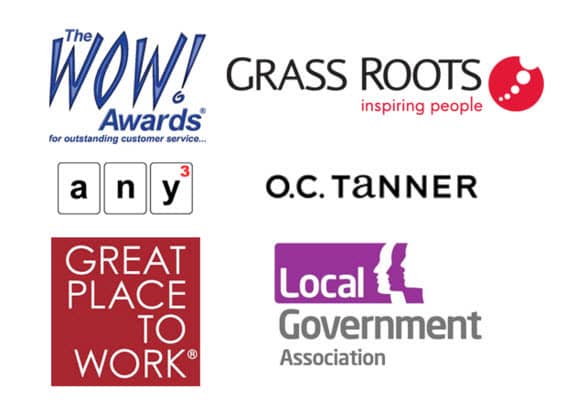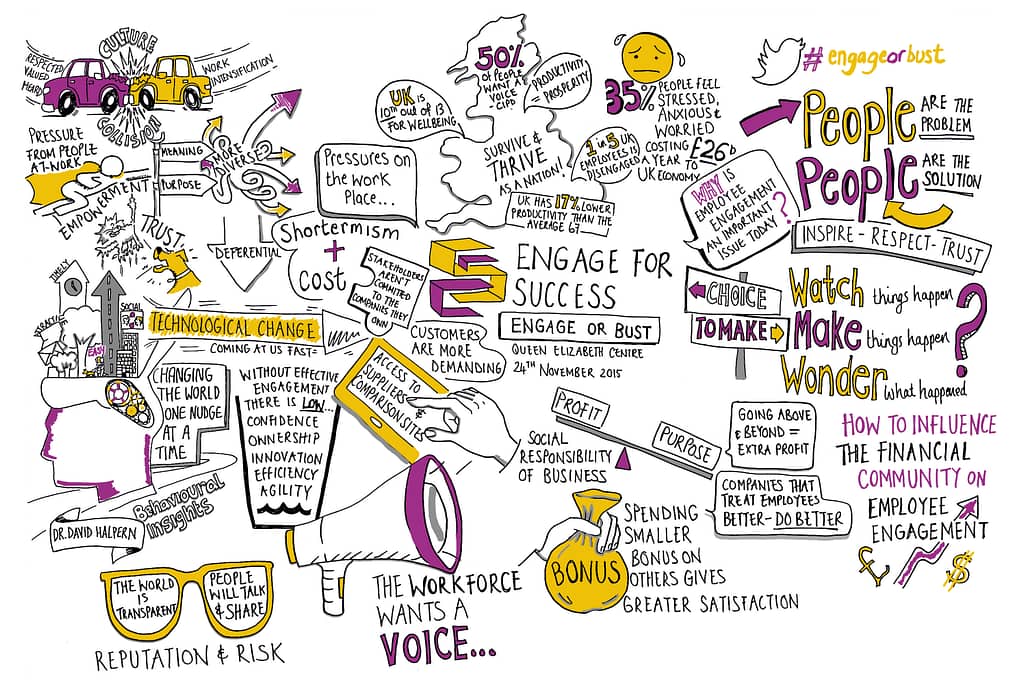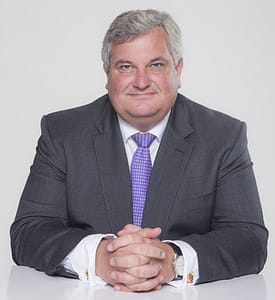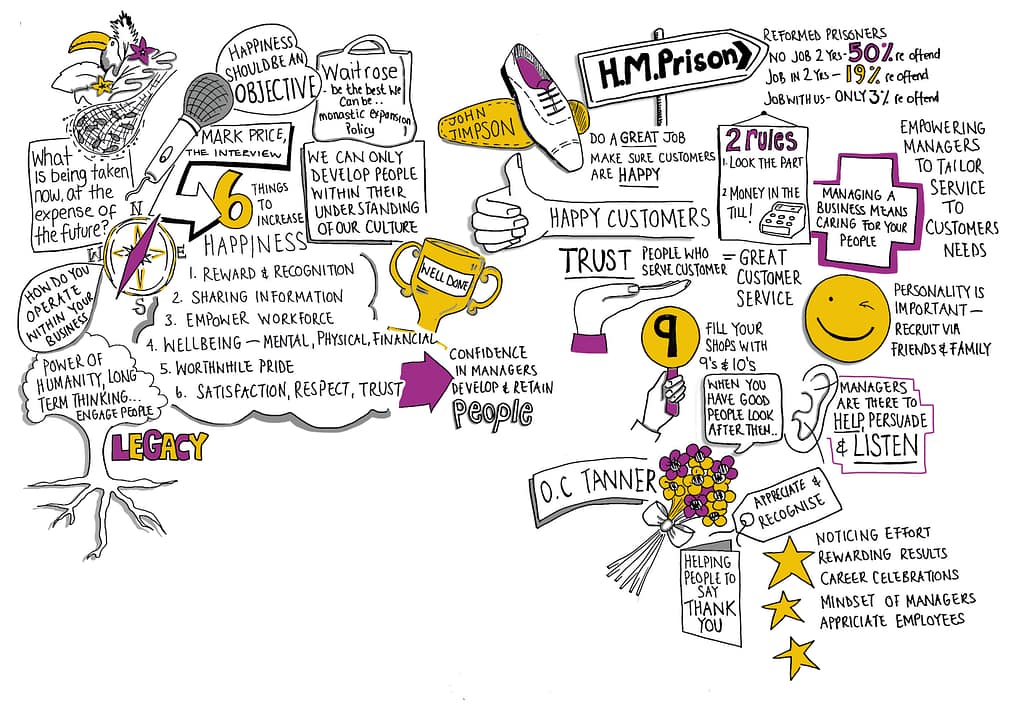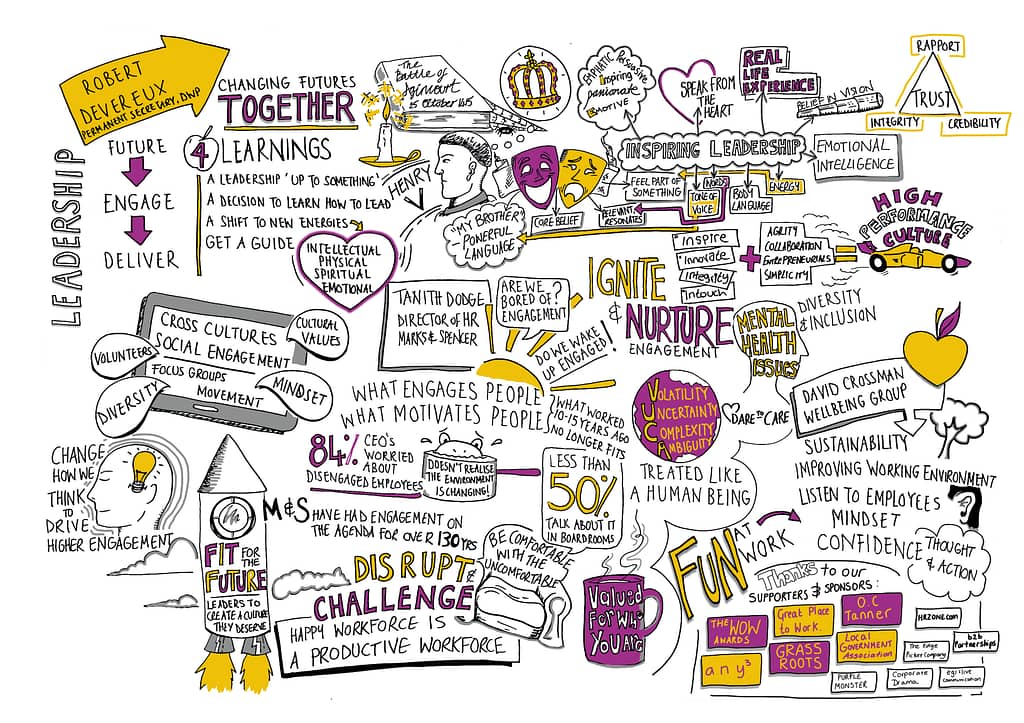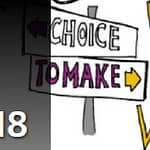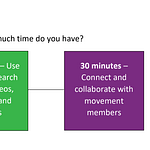If you couldn’t attend our 2015 conference ‘Engage or Bust’ on, Tuesday 24 November at the QEII Centre, London, you missed a great event. It was a real opportunity to recharge your engagement batteries.
But don’t worry because we’ve created this page where you can hear about, and watch and listen to some of our speakers
Here is a short video that really captures the atmosphere and success of the day. Thanks to the Edge Picture Company for their hard work.
David Macleod and Nita Clarke kicked off our day with a pithy summary of the productivity challenge facing UK plc, the pressures organisations are facing from short-termism, increasing customer demand, technological change, global competition, and, as we were reminded by the events in Paris the preceding weekend, terrorism, all leading to work intensification.
UK employees want fairness, trust, meaning and purpose at work, empowerment, and are speaking with a more diverse, less deferential, more demanding voice. We are facing a cultural collision as these pressures and demands meet, with the resulting outcomes for employees of lower wellbeing, lower trust, growing mental health issues and lower engagement, leading to less energy, confidence, ownership, innovation, efficiency, agility and productivity.
We face a choice: to squeeze, control and monitor because our people are the problem; or to inspire, trust and respect because our people are the solution. The world will know the choice we make, so will we watch things happen, make things happen, or wonder what happened!
David Halpern, Director of the Behavioural Insights Team, opened a new door for us as he talked us through some of things his team had been making happen across the UK and the globe to introduce a more realistic human behaviour model into a myriad of interactions between public authorities and citizens to enable people to make better choices.
Framed round a template of making things easy, attractive, timely and social, in order to ‘take out the friction’, he showed us how small changes to processes – letters, tests, scripts, web design – has helped get more people back into work, improved tax collection rates, increased diversity in the police, and reduced drop-out rates at college.
He challenged us to think about how we could apply this in the relationship key to building employee engagement in an organisation, that of manager and job holder, and in particular to the process of giving feedback, and how the words we use can inspire people to greater effort or can turn them off.
He then gave us a further challenge to move beyond making small changes to processes, to thinking more radically about our policies and goals.
Does recognition and reward work best when the employee receives a reward from the organisation or when the organisation empowers its employees to give rewards to each other? Would British hospitals have better health outcomes if they followed the Swedish model of providing a partner or family member with a bed next to a loved one to be able to care for them?
Alex Edmans, Professor of Finance, London Business School, asked whether organisations should exist for profit or purpose. He challenged the traditional views that employees are no different from any other input, that there is no need for motivation, that employee satisfaction is a sign of managerial slackness, and that there is little evidence that investing in employees benefits shareholders.
He talked about the transformational role social responsibility has played since Marks and Spencer realised that having healthy staff was vital to give great customer service and introduced nutritious midday meals for their employees, and since Merck and Co shared the secret of penicillin manufacture with their competitors so that more human lives could be saved.
Alex demonstrated through his research into profit and employee engagement metrics for the 100 Best Companies to work for in the USA that they beat their peers 1984-2009 by 2-3% growth per year, firmly concluding that companies that treat their employees better do better.
He left us with the challenge to change City analysis for shareholders to take this into account. Engage For Success has an Investors and Shareholders Thought and Action Group looking at this topic. Could you help us develop and lead thought in this area to bring about practical change and action?
Mark Price, Managing Director of Waitrose, further developed this discussion about profit and purpose as he spoke to us about the driving ethos of Waitrose plc, and the company’s supreme goal of ensuring the happiness of its partners.
This means fairness in pay and reward, great communications within the organisation, encouraging partner involvement and voice, a strong focus on employee physical, mental, emotional and financial well-being, thinking about employees as a principal asset rather than a resource, ensuring they have a purpose and are proud of the organisation, and satisfied in their work, and that they enjoy respect and trust.
The key relationship is that between line manager and the job holder, and Waitrose spends time ensuring its managers are fully immersed in and practising Waitrose’s values.
John Timpson, Chairman of Timpsons, took this one stage further as he discussed his personal approach to his business and his employees as he set out his ‘upside down management’ including his ‘upside down management chart’, a visual representation that managers are there not to tell employees what to do, but to help employees do their job.
John’s philosophy is to trust the people who service the customer and to give them the freedom to give great customer service. He looks for personalities who will give great customer service, and then trains them to deliver the services Timpsons offers its customers.
Employees in Timpsons’ shops must ‘look the part’ and ‘put the money in the till’. They are encouraged to use their initiative to provide great customer service. If you don’t fit in, Timpsons aims to ‘part as friends’. Loyalty is rewarded with your birthday off every year, the opportunity to holiday for free in a Timpsons holiday home, a ‘Dreams Come True’ scheme, and access to a hardship scheme in adverse circumstances.
Employees rate their performance and are involved in an individual review of their pay. Timpsons offer rehabilitation opportunities to some 300 former and serving prisoners.
John had us open-mouthed in amazement the simplicity, yet obvious effectiveness of his business principles, laughing as he talked about his successes and learning moments, and moved to tears as he humbly demonstrated the strength of his core values not only as he talked about his employees, whom he and his son James visit regularly in their shops to talk about the business, but also through his and his wife’s fostering during their lifetime of some 80 children.
John showed us clearly what he has decided should be his priorities and how he has built his diary around spending time on those priorities.
This was also true of Robert Devereux, Permanent Secretary at the Department of Work and Pensions, who with Steve Ratcliffe, told us about how he has focussed on developing the DWP Story, over the past few years, and discussing it, not just with his top team, but with some 6,000 managers at regular points throughout year, so that the whole Department is more focussed on the goals it is committed to delivering, and all DWP staff are more involved in sharing and talking about the future.
Robert has reaped the reward of prioritising his time and diary on the DWP Story. Levels of employee engagement have increased in DWP since he began this.
Mark Huggins of Corporate Drama, changed tack for us by giving us a very different way of thinking about work and motivating employees through the lens of William Shakespeare’s Henry V. How does an unproved king, faced by opposition among his peers, and lack of trust in his troops, rally them to out-perform a better resourced and larger opponent?
Tanith Dodge, Director HR at Marks and Spencer, took us further into this world of motivating staff by giving them an immersive experience of something completely different from the normal working day, and bringing back into the workplace increased self-confidence, self-motivated, and new ideas developed in a very different context.
Marks and Spencer has been thinking about how to motivate five generations of staff in the VUCA world – volatile, uncertain, complex and ambiguous – and how to translate its values of inspire, innovate, have integrity, and be in touch with each other and our customers into what is required to survive in the VUCA world – speed and agility in decision making, entrepreneurialism, simplicity and collaboration.
Tanith described programmes for its leaders and managers, aimed at making them fit to lead the future and bring about a cultural shift to ‘enhancing lives every day’, which were disruptive, challenging and created a lot of noise.
Groups were give 6 weeks, on top of their day jobs, to come up with recommendations for sorting out some big social problems, such as how to tackle food waste, how to ensure the future of farming given the average age of British farmers is 58, how to help the one in four of us who experience poor mental health.
Other managers were given immersive individual experiences they could choose from such as a day painting. Others were involved in team experiences. All with the purpose of helping Marks and Spencer people being comfortable with the uncomfortable and strengthening their understanding and practice of its core values.
There was further opportunity to reflect on themes of the day as three of Engage For Success’ Thought and Action Groups showcased their work this year – Cross Cultures, Social Engagement, and Wellbeing.
A BIG THANK YOU to Adina Luca, Cinthya Quijano, John Smythe and David Crossman for opening these up for us, and to Kellie Lord from Business in the Community, Shirley Duncalf from Bidvest Foodservices, and Nicole Ferguson from Wrightington, Wigan and Leigh NHS Foundation Trust for enriching our understanding of what practical action different types of organisation are taking.
Click on the links to find out more about these groups, and look at the Regional Thought and Action Groups and the Topic/ Sector Thought and Action Groups to see how you can get involved.
Engage or Bust! – a great day, where we kept to time!, enjoyed the excellent conference space that is the QEII Centre, delicious refreshments provided by O C Tanner, and great exhibition stalls from our sponsors The WOW! Awards, Grass Roots, OC Tanner, Great Place to Work, the Local Government Association, and any3.
A BIG THANKYOU!! to them and to our Supporters Purple Monster (for their amazing images), PB Projects and egi:live communication, b2b partnerships, The Edge Picture Company, and Corporate Drama. And to our Media Partner HRZone.com.

